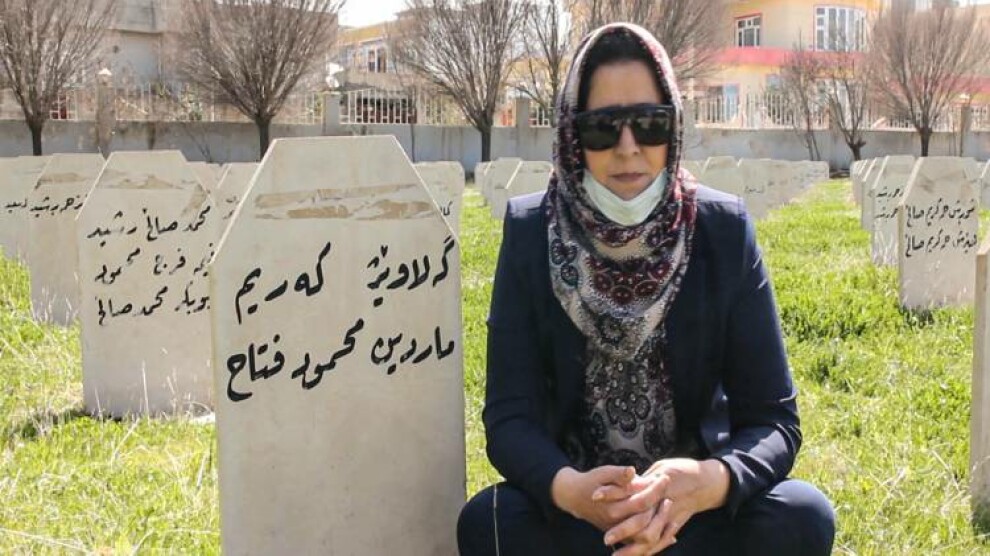Story of a missing girl from Halabja: She was recorded as dead, a grave was dug in her name, is now looking for missing children

Mardin Mahmut Fettah is a woman, who lost her family in Aleppo, then was adopted by an Iranian family, and 12 years later, she found out the truth and began her journey to find herself. She is alive but has a grave because she was recorded dead after the Halabja chemical attack. She told us her story while looking at her grave; “After returning to my country, I studied and founded an association to find missing children like me. Now I am the chairperson of the association and looking for missing children along with their families.”
MİHREBAN SELAM KAKAYÎ
Halabja- Halabja is known as the city where the spring and life are killed, and covered with death smelling like apple… Still, cries of pain arise from that city. Mourning of women arises from the city… 33 years have passed but Halabja hasn’t been healed. The victims of the Halabja chemical attack lie down in the middle of the city. Thousands of graves and mass graves… Still, mothers and families look for graves of their children in the city.
She declared dead in official records
Have you ever heard about missing girls and children of Halabja? Mardin is one of the missing children of Halabja. A grave was dug for her because she was missing for years. She was buried while she was alive. On March 16, 1988, the Iraqi Ba'ath regime attacked Halabja by using chemical weapons and Mardin's family took shelter in a basement hoping to survive. They survived but with the wounds caused by the Halabja massacre, with the pain for their losses. One of those they lost is Mardin. Mardin was found by one of the Iranian military rescue teams went to Halapça to help people after the chemical attack and taken to Iran.
She thought the family she lived with for 12 years was her real family
Mardin received medical treatment in a hospital for three months. Then, she was adopted by an Iranian family. She thought the family she lived with for 12 years was her real family. One day, she was playing with her friends in the street and one of her friends told her, “You are from Halabja, this family is not your real family”. Mardin became suspicious but she didn’t want to believe it and thought it was a joke. But years later, she heard her mother while talking about her with one of her friends. And she understood that she was adopted. Mardin began to ask herself, “Who am I?”
And Mardin Mahmut Fetah’s journey began…
“My name is Mardin Mahmut Fetah. I am one of the missing children of Halabja. I was in a basement with my family during the Halabja chemical attack carried out on March 16, 1988. Iranian soldiers came to Halabja to help people after the attack. They found me and took me to Iran. After spending three months in a hospital, I was adopted by an Iranian family. I lived with this family for 12 years. One day, I was playing with my friends in the street and one of my friends told me, ‘You are from Halabja, this family is not your real family.’ Then, I heard my mother talking with one of her friends at home. I heard that I was actually from Halabja. Then they told me the truth. The person I knew as my father for years became ill and he asked me to go and find my real family before he died,” Mardin told us. She returned to Halabja to find herself.
She prepared a missing poster to find her real family
Even if Mardin knew that her journey would be a difficult journey, she returned to Halabja hoping to find her family and who she was. In 1998, she went to Iraq from Iran. She prepared a missing poster to find her real family and waited for her family to find her. “Of course, my journey to find my real family wasn’t easy. Eventually, I returned to Iraq and came to Halabja. Means of communications were not good at that time. I prepared a missing poster and wrote that I am one of the missing girls of Halabja. I found my relatives, who are still alive, and I have lived in Halabja since then.”
She told us her story while looking at her grave
Mardin told us her story while looking at her grave at the Halabja Cemetery. “I'm the one lying down here, but I am alive”, Mardin said, “This grave is my grave. The Iraqi government enacted a law for those who disappeared in the Halabja massacre and declared them dead in official records. Symbolic graves were dug for missing people. I am one of the people of Halabja, who is still alive but dead in official records.”
She founded an association to find missing children
Mardin restarts her life after finding her real family and relatives and she founded an association called, “Association for Finding the Missing Children” to find other missing children of Halabja. “After returning to my country, I studied and started to search for missing children like me. Then our number increased. We are looking for the missing children of Halabja now. We didn’t name our association as, “Association for Finding the Lost Children of Halabja” because there are many missing children across Iraq.”
